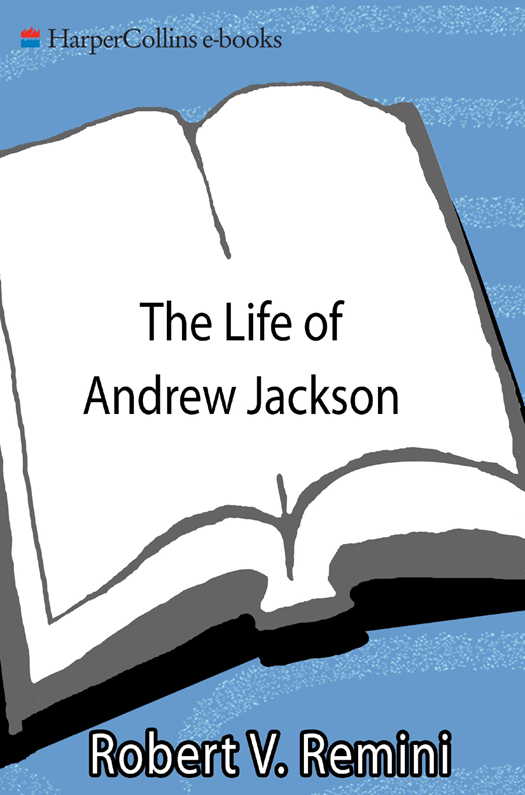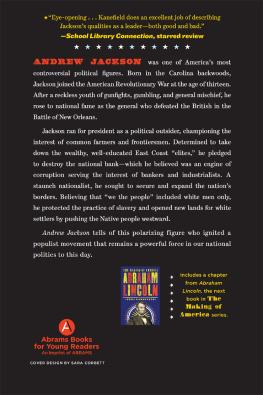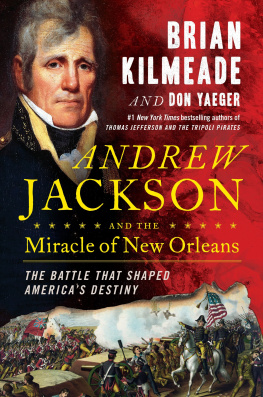
The Life of Andrew Jackson
Robert V. Remini

For My Granddaughter, Grace Marie
Contents
In 1977 the first volume of my biography of Andrew Jackson appeared in print, followed in 1981 and 1984 by the second and then the concluding volumes. When I first undertook this project I had intended to write a complete life in one volume. But it did not work out that way. One volume grew to a second and a third, and I might have gone on to produce a fourth had my editor at Harper & Row, Hugh Van Dusen, not intervened in the nick of time.
Then, at the annual meeting of the American Historical Association in December 1984 I was conversing with Aida D. Donald, executive editor of the Harvard University Press, when she broached the idea of condensing my three-volume biography into a single volume. She said that the idea had originated with her husband, David Herbert Donald, who felt that such a book would serve the needs of both students of history and the general public. I confess the idea had not occurred to me before, and later that day when I talked with David he dispelled whatever doubts I may have had.
Jackson is one of those unusual figures in history who seem to get multi-volume biographies written about them, such as my own and those of James Parton, Marquis James, and James Bassett, or he is reduced to narratives of less than two hundred pagesIve written one of these, also, I must confesswhich are used almost exclusively in survey courses in American history taught in colleges and universities. Something in-between, something of more normal size for a major historical figure, some-thing around four hundred pages or so for a biography of Jackson is almost unknown. And it was David Donalds contention that such a book was needed for an audience of both students and the general public who cannot or will not plow through two and three hefty volumes and yet cannot get enough information or analysis of men and events in the briefer studies.
By the time our conversation ended I was totally convinced. But I was not certain that Harper & Row would go along with the scheme since they had already invested a great deal in issuing a three-volume study. Fortunately, Hugh Van Dusen liked the idea very much and probably saw more value in it than I did. In any event he approved the venture and I set to work in the mistaken notion that a single volume could easily and quickly be extracted from the three-volume behemoth. I soon learned otherwise. Shrinking 1,609 pagesthe total number of the three volumesto the present 400 pages proved not simply difficult but traumatic and agonizing. Jackson had such a long, full and exciting life that he defies (and resents) abbreviation of any kind. More difficult than that was applying the surgical knife to my own prose and restating with totally new words the events and ideas that I had once felt were as exact and proper as I could make them when they were first produced in the original volumes. But once I made the initial incision and survived the awful pain, the task grew less difficult and wrenching, particularly when I found several opportunities to rethink more carefully what I had originally set down. Also, the results of recent research could be added; and the insights of mono-graphs published in the last several years could be introduced to enrich the text. Finally, some of my rhetorical flourishes needed excision.
In this new work, then, I have not abandoned or seriously modified the major themes developed in my three-volume biography but I have tried to strengthen the arguments and clarify the language that provide support. The notes have been reduced substantially to provide space but I have made a special effort to retain all the citations that are essential for the books principal arguments. The bibliography, too, has been cut drastically and I would refer the reader to volume III of my larger work for a more complete discussion of both primary and secondary sources.
In making this biography possible I am deeply grateful to Hugh Van Dusen, David and Aida Donald, and, as always, the Ladies Hermitage Association in Tennessee and the University of Illinois at Chicago who have handsomely supported my research for many years.
July 1987
Wilmette, Illinois
R OBERT V. R EMINI
| 1767, March 15 | Born, Waxhaw settlement, South Carolina |
| 1775-1780 | Attends schools conducted by Dr. William Humphries and James White Stephenson |
| 1780-1781 | Serves in American Revolution; captured and wounded by British officer; imprisoned in Camden and later released; contracts smallpox |
| 1781 | Death of mother, Elizabeth Hutchinson Jackson |
| 1782 | Attends school conducted by Robert McCulloch |
| 1783-1784 | Teaches school in Waxhaw |
| 1784-1786 | Moves to Salisbury, North Carolina, and reads law with Spruce McCay |
| 1786-1787 | Reads law with John Stokes |
| 1787, September 26 | Licensed as an attorney in North Carolina; practices law and tends store |
| 1788 | Appointed public prosecutor for western district of North Carolina and migrates west; fights first duel with Waightstill Avery; settles in Nashville |
| 1790-1791 | Marries Rachel Donelson Robards for the first time |
| 1791, February 15 | Appointed attorney general for the Mero District |
| 1794, January 18 | Remarries Rachel Donelson Robards |
| 1796, January 11-February 6 | Participates in Tennessee Constitutional Convention |
| 1796, October 22 | Elected to U.S. House of Representatives |
| 1797, September 26 | Elected to U.S. Senate |
| 1798 | Resigns Senate seat |
| 1798, December 20 | Elected judge of Tennessee Superior Court |
| 1802, February 5 | Elected major general of Tennessee militia |
| 1804, April | Forms business partnership with John Coffee and John Hutchings |
| 1804, July 24 | Resigns as judge |
| 1804, August 4 | Purchases Hermitage property |
| 1805-1807 | Participates in Burr conspiracy |
| 1806, May 30 | Kills Charles Dickinson |
| 1809 | Adopts son of Elizabeth and Severn Donelson |
| 1812-1815 | Leads troops against Indians and British |
| 1813, March | Nicknamed Old Hickory |
| 1813, September 4 | Gunfight with the Bentons |
| 1813, November 3 | "Adopts" Lyncoya |
| 1814, March 27 | Defeats Creek Indians at Horseshoe Bend |
| 1814, August 9 | Imposes Treaty of Fort Jackson on Creek Nation |
| 1814, November 7 | Captures Pensacola |
| 1814, December 1 | Arrives in New Orleans |
| 1815, January 8 | Defeats British advance toward New Orleans |
| 1815, March 31 | Fined for contempt of court |
| 1816-1818 | Signs treaties with Indian tribes |
| 1818, March 15 | Invades Spanish Florida |
| 1818, April 6 | Captures St. Marks |
| 1818, April 29 | Orders execution of Robert Ambrister and Alexander Arbuthnot |
| 1818, May 24 | Captures Pensacola |
| 1819, February 8 |










